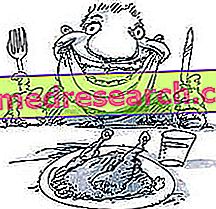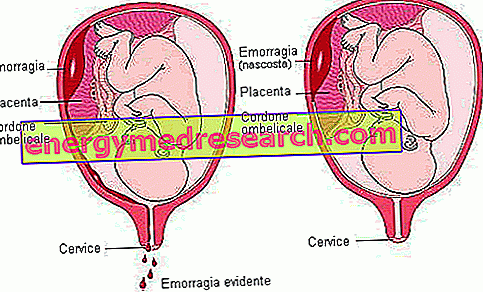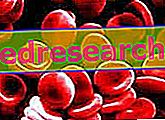Before starting a new diet, contact a specialized doctor to make sure there are no contraindications. The following dietary advice is generally valid but could be contraindicated in the presence of specific pathological conditions.
- Limit the consumption of sugary and carbonated drinks.
- Limit the consumption of alcohol, that is, do not drink more than a quarter of wine, half a liter of beer, or two glasses a day (for very thin women or men these quantities must be halved). Further reduce or eliminate the intake of alcoholic beverages if you are overweight or obese or if you are familiar with diabetes, obesity, hypertriglyceridemia, etc.

- Limit the consumption of simple sugars (sugar, sweets, sugary drinks) especially in the evening. Use in a controlled quantity the sweet products to spread on bread or on rusks (such as jams, fruit jams, honey and creams)
- Vegetables should be consumed, preferably raw or steamed.
- Yogurt does not necessarily have to be thin, but avoid fruit yoghurt, which generally contains a lot of sugars. If you consume so much milk, preferably choose the skimmed or partially skimmed milk, which still retains its calcium content.
- Keep the dietary fiber intake high (eat lots of fruits and vegetables).
- It is important to ensure the minimum daily doses of essential fatty acids, so replace meat with fish at least 3 times a week.
- Drink at least 2 liters of water per day (30 ml per kg of body weight). Increase the doses if the color of the urine is too dark and / or odor (for example in the summer period or more generally when you do sports and sweat a lot). Drink frequently and in small quantities. The water balance must be maintained by essentially drinking water, both tap water and bottled water, both safe and controlled. Remember that in addition to supplying water, different beverages (such as orangeade, cola-type drinks, fruit juices, coffee, tea) also provide other substances that contain calories (such as simple sugars) or are pharmacologically active (eg caffeine). These drinks should be used in moderation.
- Try, if possible, never to skip snacks. If you are away from home, bring a protein bar or a zone bar with you. See: Diet and snacks
- You prefer white meat (chicken, turkey, rabbit) to red (beef, pork), but don't completely exclude the latter from your diet.
- Eat slowly this way you will feel full faster
- Never train on a full stomach. See: Features of the pre and post workout meal
- Give yourself one day a week to eat what you prefer.
- It consumes whole grain pasta or rice, especially in the evening. Be careful, however, with the combination of whole foods rich in fiber and fruit as they are combined to give rise to fermentation processes.
- If you are fat, do not hide behind an excuse: will is power. Remember that even the palate can be educated within a few weeks.
- Getting used to new tastes and dietary principles takes some time but, generally, what may seem strange at the outset after a few attempts gives a better impression until it becomes completely normal.
- Pay close attention to "useless" calories, see: useless calories
- Limit the consumption of fat cheeses and prefer the leaner ones like Piedmontese ricotta, mozzarella, Carthusian, robiola, crescenza.
- To avoid eating more than you should or give in to too much temptation, brush your teeth after finishing the meal, or put chewing gum or sugar-free aromatic candies in your mouth.
- If you feel hungry before going to bed, try drinking a nice glass of milk, as well as resting better you will avoid waking up at night in the grip of hunger attacks.
- Avoid consuming sausages and preserved meat whose ingredients include nitrites (E249 E250).
- The eggs can be consumed with a certain freedom (up to 4 per week, distributed over several days) see: cholesterol and eggs.
- Meals should not be too rich and elaborate it is better to make small meals (at least 4) than one or two binges a day. Breakfast is very important and should satisfy about 20% of daily caloric needs.
- The healthiest cooking methods include steaming and using a pressure cooker. Frying and grilling are potentially harmful methods for health.
- Use seasoning fats preferably raw and avoid re-using the fats and oils already cooked.
- In any case, if you occasionally decide to fry foods, preferably use olive oil, peanut oil or refined oils in general; instead, butter and oils rich in polyunsaturated fatty acids (wheat, corn or grapeseed germs) should be absolutely avoided
- When possible, choose foods grown using organic farming methods and integrated pest management that are relatively free of toxic residues from chemical fertilizers, herbicides and fungicides.
- If you have to go out for dinner, take a little snack an hour before going out. In this way you will avoid overeating and your food choices will be more balanced (save for example the dessert at the end of the meal).
- Learn to do the shopping: read the nutrition labels and prepare a list indicating only what you need.
- Limit the consumption of ready-to-eat and pre-cooked foods, but go ahead for fresh and frozen vegetables.
- Gradually reduce the use of salt both at the table and in the kitchen. Prefer the salt enriched with iodine (iodized salt) to the common salt. Replace the salt with aromatic herbs (such as garlic, onion, basil, parsley, rosemary, sage, mint, oregano, marjoram, celery, leek, thyme, fennel seeds) and spices (such as pepper, chilli, nutmeg, saffron, curry ). Enhances the flavor of foods using lemon juice and vinegar. Choose, when available, the product lines with a low salt content (bread without salt, canned tuna with a low salt content, etc.).
- Often hunger attacks simply hide a "need" for water; instead of eating try to drink in abundance.
- Never go shopping on an empty stomach, this could lead you to buy high-calorie, unhealthy foods that you would like to stay away from.
Only occasionally consumes processed foods rich in salt (salty snacks, potato chips in the bag, table olives, some cold cuts and cheeses).
Special tips for special people »
Feeding advice




